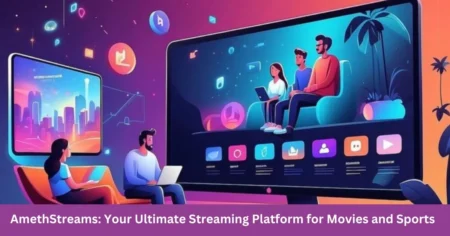The digital era has revolutionized how we consume content, with countless streaming platforms competing to capture our attention. Among these platforms, one name that has gained significant popularity, particularly in India, is iBomma. While not as globally recognized as Netflix or Amazon Prime, iBomma has become a staple for Telugu-speaking audiences. This article explores iBomma, its rise to prominence, the controversies surrounding it, and its broader impact on digital content consumption.
The Emergence of iBomma
What is iBomma?
iBomma is an online streaming platform that primarily offers Telugu-language films and shows. Unlike mainstream platforms that operate on a subscription-based model, iBomma provides its content for free, which has made it immensely popular among Telugu-speaking audiences in India and abroad. The platform is easily accessible via its website and mobile applications, allowing users to stream and download content.
The Growth of Regional Content Platforms
The rapid growth of regional content platforms like iBomma can be attributed to several factors. Firstly, there is a massive demand for content in regional languages, particularly in India, where linguistic diversity is vast. While global platforms like Netflix and Amazon Prime cater to a broader audience, regional platforms like iBomma specifically target niche markets, offering content that resonates more with local cultures and languages.
Secondly, the proliferation of affordable smartphones and data plans has enabled wider access to online content. This has democratized content consumption, allowing people from all walks of life to access entertainment at their fingertips. iBomma, with its free content and regional focus, has effectively tapped into this market.
Content Library and User Experience
iBomma’s content library is extensive, featuring a wide array of Telugu movies, ranging from the latest blockbusters to classic hits. The platform also offers web series, dubbed movies, and television shows. Its user interface is straightforward and designed to be accessible even to those who are not tech-savvy. The website and app are regularly updated with new releases, ensuring that users have access to the latest content.
The Controversies Surrounding iBomma
Legality and Copyright Issues
One of the most significant controversies surrounding iBomma is the legality of its operations. Many of the movies and shows available on iBomma are offered without proper licensing agreements with the content creators. This has led to accusations of piracy, as the platform is essentially distributing copyrighted material without authorization.
Content creators and copyright holders have raised concerns over the financial losses incurred due to the widespread availability of pirated content on iBomma. In many cases, films are uploaded to the platform shortly after their theatrical release, depriving filmmakers of potential box office revenue.
Impact on the Entertainment Industry
The proliferation of platforms like iBomma has a significant impact on the entertainment industry, particularly in the context of revenue generation. The Indian film industry, including the Telugu cinema (Tollywood), relies heavily on theatrical releases and official streaming partnerships for revenue. When content is pirated and made available for free, it undercuts the potential earnings for producers, distributors, and actors.
Moreover, the ease of access to pirated content discourages people from purchasing legitimate subscriptions to official streaming platforms, further exacerbating the problem. The ripple effect of this extends to the broader entertainment ecosystem, affecting everyone from crew members to local theater owners.
Legal Actions and Crackdowns
In response to the growing concerns over piracy, authorities and copyright holders have taken legal actions against platforms like iBomma. There have been instances where the website has been taken down, only to resurface under a different domain name. The cat-and-mouse game between law enforcement and such platforms continues, highlighting the challenges of regulating online piracy.
Despite these crackdowns, iBomma and similar platforms remain accessible through various means, indicating the difficulty in permanently shutting down such operations. This ongoing battle raises questions about the effectiveness of current anti-piracy laws and the need for stronger digital rights management practices.
The Impact of iBomma on Digital Content Consumption

Changing Viewing Habits
iBomma has played a role in changing the viewing habits of its audience. The platform’s model of offering free content has made it easier for people to access entertainment without financial barriers. This has led to an increase in the consumption of digital content, particularly among demographics that may not have been able to afford subscriptions to other platforms.
Furthermore, the convenience of on-demand streaming has shifted viewers away from traditional television and cinema-going experiences. The ability to watch content anytime, anywhere, has become a standard expectation for modern audiences, and platforms like iBomma have contributed to this shift.
The Influence on Regional Content Production
The popularity of iBomma has also had an impact on the production of regional content. As demand for Telugu content has grown, so has the production of films and web series catering to this audience. However, the challenge lies in balancing the demand for free content with the financial sustainability of producing high-quality media.
Producers and filmmakers are increasingly looking at alternative revenue streams, such as brand partnerships, product placements, and international distribution deals, to offset the losses incurred from piracy. Additionally, some creators are exploring direct-to-digital releases, bypassing traditional distribution channels in favor of online platforms.
The Broader Implications for the Streaming Industry
The rise of platforms like iBomma highlights the evolving dynamics of the streaming industry. While mainstream platforms operate on subscription or ad-supported models, iBomma’s free content model poses a challenge to these business strategies. This has prompted established players to reconsider their pricing models, content offerings, and regional strategies to better cater to local markets.
Moreover, iBomma’s popularity underscores the importance of understanding regional content preferences and the potential for growth in underserved markets. Global platforms are increasingly investing in regional content, recognizing the untapped potential in markets like India. However, the ongoing battle against piracy remains a significant hurdle in maximizing the potential of these markets.
Ethical Considerations and the Future of Content Consumption
The Ethical Dilemma of Piracy
While platforms like iBomma provide easy access to content, they also pose an ethical dilemma for users. Consuming pirated content contributes to the cycle of piracy, which has far-reaching consequences for the entertainment industry. It raises questions about the value we place on creative work and the rights of content creators to be fairly compensated for their efforts.
As consumers, there is a need to be more aware of the impact of our choices. Supporting legitimate platforms not only ensures that creators are compensated but also encourages the production of more content. It also contributes to a healthier entertainment ecosystem where innovation and creativity can thrive.
The Future of Digital Content Platforms
The future of platforms like iBomma is uncertain, given the ongoing legal battles and the increasing awareness of the consequences of piracy. However, it is clear that there is a significant demand for accessible and affordable content, particularly in regional markets. The challenge for the entertainment industry will be to find ways to meet this demand in a manner that is both sustainable and ethical.
One potential path forward is the development of more regional streaming platforms that operate legally and offer competitive pricing. These platforms could collaborate with local content creators, providing them with a platform to showcase their work while ensuring that they are fairly compensated.
Additionally, advancements in digital rights management and blockchain technology could provide more robust solutions to combat piracy. By ensuring that content is securely distributed and accessed only by authorized users, the industry could better protect its intellectual property while still catering to the needs of consumers.
FAQs
1. What is iBomma?
iBomma is an online streaming platform that offers Telugu-language movies, shows, and web series. It is popular for providing free access to a wide range of content, primarily targeting Telugu-speaking audiences.
2. Is iBomma legal?
iBomma operates in a legal gray area, as it offers many films and shows without proper licensing from content creators. This has led to accusations of piracy, making the platform controversial.
3. How can I access iBomma?
You can access iBomma through its website or mobile app, which are available for both Android and iOS devices. The platform is easy to use, with a simple interface for streaming and downloading content.
4. Does iBomma offer content in languages other than Telugu?
While iBomma primarily focuses on Telugu content, it also provides some dubbed movies and shows in other languages. However, its main audience is Telugu speakers.
5. What are the risks of using iBomma?
Using iBomma to stream or download content can pose risks, including exposure to copyrighted material without permission, which is illegal in many regions. Users may also encounter security risks such as malware from unauthorized downloads.
Conclusion
iBomma’s rise to prominence in the world of digital content streaming is a testament to the evolving landscape of content consumption. Its popularity among Telugu-speaking audiences highlights the demand for regional content and the potential for growth in these markets. However, the platform’s association with piracy raises significant ethical and legal concerns that cannot be ignored.
As the digital content landscape continues to evolve, it is essential to find a balance between accessibility and sustainability. While iBomma has undoubtedly made entertainment more accessible to many, it also underscores the need for a more equitable approach to content distribution. The future of content consumption will likely involve a combination of technological innovation, regulatory enforcement, and a shift in consumer attitudes towards supporting legitimate content platforms.
Read More: 5starsstocks: Best Practices for Long-term Investment





